- Home
- Henry James
The Daily Henry James Page 3
The Daily Henry James Read online
Page 3
February 25
Washington Square, 1881
“Try and make a clever woman of her, Lavinia; I should like her to be a clever woman.”
“My dear Austin, do you think it is better to be clever than to be good?”
“Good for what?”—asked the doctor. “You are good for nothing unless you are clever.”
February 26
The Ambassadors, 1903
At the back of his head, behind everything, was the sense that she was—there, before him, close to him, in vivid, imperative form—one of the rare women he had so often heard of, read of, thought of, but never met, whose very presence, look, voice, the mere contemporaneous fact of whom, from the moment it was at all presented, made a relation of mere recognition.
February 27
The Awkward Age, 1899
“You’re so wonderful to your friends”—oh, she could let him see that she knew!—“and in such different and exquisite ways. There are those—who get everything out of you and whom you really appear to like, or at least to put up with, just for that. Then there are those who ask nothing—and whom you like in spite of it.”
February 28
The Wings of the Dove, 1903
When Milly smiled it was a public event—when she didn’t it was a chapter of history.
February 29
The Bostonians, 1886
Her splendid hair seemed to shine; her cheek and chin had a curve which struck him by its fineness; her eyes and lips were full of smiles and greetings. She had appeared to him before as a creature of brightness, but how she lighted up the place, she irradiated, she made everything that surrounded her of no consequence; dropping upon the shabby sofa with an effect as charming as if she had been a nymph sinking on a leopard-skin, and with the native sweetness of her voice forcing him to listen till she spoke again.
March
The hour I first recall was a morning of winter drizzle and mist, of dense fog in the Bay, one of the strangest sights of which I was on my way to enjoy; and I had stopped in the heart of the business quarter to pick up a friend who was to be my companion. The weather, such as it was, worked wonders for the upper reaches of the buildings, round which it drifted and hung very much as about the flanks and summits of emergent mountain-masses—for, to be just all round, there was some evidence of their having a message for the eyes. Let me parenthesize, once for all, that there are other glimpses of this message, up and down the city, frequently to be caught; lights and shades of winter and summer air, of the literally “finishing” afternoon in particular, when refinement of modelling descends from the skies and lends the white towers, all new and crude and commercial and over-windowed as they are, a fleeting distinction.
The American Scene, 1907
March 1
New England: An Autumn Impression, 1905
He had turned his steps, for the pleasure of memory, to Fresh Pond, dear to the muses of youth, the Sunday afternoons of spring, and had to accept there his clearest vision perhaps of the new differences and indifferences. The desecrated, the destroyed resort had favored, save on rare feast days, the single stroll, or at the worst the double, dedicated to shared literary secrets; which was why I almost angrily missed, among the ruins, what I had mainly gone back to recover—some echo of the dreams of youth, the titles of tales, the communities of friendship, the sympathies and patience, in fine, of dear W. D. H.
March 2
The Altar of the Dead, 1895
“How you must have loved him!”
“Women are not like men. They can love even where they’ve suffered.”
March 3
The Golden Bowl, 1904
“I should be interested to see some sense you don’t possess.”
“The moral, dear Mrs. Assingham. I mean, always, as you others consider it. I’ve of course something that in our poor dear backward old Rome sufficiently passes for it. But it’s no more like yours than the tortuous stone staircase—half ruined into the bargain!—in some castle of our quattro cento is like the lightning elevator in one of Mr. Verver’s fifteen-story buildings. Your moral sense works by steam—it sends you up like a rocket. Ours is slow and steep and unlighted, with so many of the steps missing that—well, that it’s as short, in almost any case, to turn round and come down again.”
March 4
Poor Richard, 1867
He had told her that she was an enchantress, and this assertion, too, had its measure of truth. But her spell was a steady one; it sprang not from her beauty, her wit, her grace—it sprang from her character. In other words Gertrude exercised the magnificent power of making her lover forget her face.
March 5
The Wings of the Dove, 1903
Densher himself was not unconscious in respect to this of a certain broad brotherhood with Mrs. Stringham; wondering indeed, while he followed the talk, how it might move American nerves. He had only heard of them before, but in his recent tour he had caught them in the fact, and there was now a moment or two when it came to him that he had perhaps—and not in the way of an escape—taken a lesson from them.
March 6
George du Maurier, 1883
Du Maurier possesses in perfection the independence of the genuine artist in the presence of a hundred worldly superstitions and absurdities. We have said, however, that the morality, so to speak, of his drawings was a subordinate question: what we wished to insist upon is their completeness, their grace, their beauty, their rare pictorial character.
March 7
The Portrait of a Lady, 1881
“A large fortune means freedom, and I am afraid of that. It’s such a fine thing and one should make such a good use of it. If one didn’t, one would be ashamed. And one must always be thinking—it’s a constant effort. I am not sure it’s not a greater happiness to be powerless.”
“For weak people I have no doubt it’s a greater happiness. For weak people the effort not to be contemptible must be great.”
March 8
Roderick Hudson, 1875
“I fancy it is our peculiar good luck that we don’t see the limits of our minds,” said Rowland. “We are young, compared with what we may one day be. That belongs to youth; it is perhaps the best part of it. They say that old people do find themselves at last face to face with a solid blank wall and stand thumping against it in vain. It resounds, it seems to have something beyond it, but it won’t move! That’s only a reason for living with open doors as long as we can.”
March 9
The Reverberator, 1888
For these candid minds the newspapers and all they contained were a part of the general fatality of things, of the recurrent freshness of the universe, coming out like the sun in the morning or the stars at night.
March 10
The Golden Bowl, 1904
“Do you consider that we are careless of mankind?—living as we do in the biggest crowd in the world, and running about always pursued and pursuing.”
“Well I don’t know. We get nothing but the fun, do we?”
“No,” she hastened to declare; “we certainly get nothing but the fun.”
“We do it all,” he had remarked, “so beautifully.”
“We do it all so beautifully. I see what you mean.”
“Well, I mean too,” he had gone on, “that we haven’t, no doubt, enough, the sense of difficulty.”
“Enough? Enough for what?”
“Enough not to be selfish.”
March 11
Washington Square, 1881
In those days in New York there were still a few altar fires flickering in the temple of Republican simplicity, and Dr. Sloper would have been glad to see his daughter present herself, with a classic grace, as priestess of this mild faith.
March 12
The Wings of the Dove, 1903
It was rich, romantic, abysmal, to have, as was evident, thousands and thousands a year, to have youth and intelligence and, if not beauty, at least in equal measure, a high, dim, cha
rming, ambiguous oddity, which was even better, and then, on top of all, to enjoy boundless freedom, the freedom of the wind in the desert—it was unspeakably touching to be so equipped and yet to have been reduced by fortune to little humble-minded mistakes.
March 13
The Altar of the Dead, 1895
But the time he gave to his devotion came to seem to him more a contribution to his other interests than a betrayal of them. Even a loaded life might be easier when one had added a new necessity to it.
March 14
The Golden Bowl, 1904
“One mustn’t take advantage of her character—one mustn’t, if not for her, at least for one’s self. She saves one such trouble.”
“She certainly gives one no trouble.—She’s not self-ish—God forgive her!—enough.”
“That’s what I mean—she’s not selfish enough. There’s nothing, absolutely, that one need do for her. She’s so modest—she doesn’t miss things. I mean if you love her rather, I should say, if she loves you. She lets it go.”
March 15
The Princess Casamassima, 1886
He had still a delighted attention to spare for the green dimness of leafy lanes, the attraction of meadow-paths that led from stile to stile and seemed a clue to some pastoral happiness, some secret of the fields; the hedges thick with flowers, bewilderingly common, for which he knew no names, the picture-making quality of thatched cottages, the mystery and sweetness of blue distances, the bloom of rural complexions, the quaintness of little girls bobbing curtsies by waysides (a sort of homage he had never prefigured); the soft sense of the turf under feet that had never ached but from paving stones.
March 16
The Awkward Age, 1899
“My dear thing, it all comes back, as everything always does, simply to personal pluck. It’s only a question, no matter when or where, of having enough.”
March 17
The Europeans, 1878
It is beside the matter to say he had a good conscience; for the best conscience is a sort of self-reproach, and this young man’s brilliantly healthy nature spent itself in objective good intentions which were ignorant of any test save exactness in hitting the mark.
March 18
The Golden Bowl, 1904
Once more, as a man conscious of having known many women, he could assist, as he would have called it, at the recurrent, the predestined phenomenon, the thing always as certain as sunrise or the coming round of Saints’ days, the doing by the woman of the thing that gave her away. She did it, ever, inevitably, infallibly—she couldn’t possibly not do it. It was her nature, it was her life, and the man could always expect it without lifting a finger.
March 19
The Portrait of a Lady, 1881
Of course the danger of a high spirit is the danger of inconsistency—the danger of keeping up the flag after the place has surrendered; a sort of behavior so anomalous as to be almost a dishonor to the flag.
March 20
The Reverberator, 1888
She thought of the lively and chatty letters that they had always seen in the papers and wondered whether they all meant a violation of sanctities, a convulsion of homes, a burning of smitten faces, a rupture of girls’ engagements.
March 21
The Golden Bowl, 1904
An ability, of a truth, is an aid to success; it has even been known to be the principle of large accumulations.
March 22
Europe, 1900
Jane’s yearning was the sharpest. She struggled with it as people at Brookbridge mostly struggled with what they liked, but fate, by threatening to prevent what she disliked, and what was therefore duty—which was to stay at home instead of Maria—had bewildered her, I judged, not a little.
March 23
A Landscape Painter, 1866
“There are not five people in the world who really care for me.”—“Really care? I am afraid you look too close. And then I think five good friends is a very large number. I think myself very well off with half a one. But if you are friendless it’s probably your own fault.”
March 24
The Bostonians, 1886
It was recognized, liberally enough, that there were many things—perhaps even too many—New York could give; but this was felt to make no difference in the constant fact that what you had most to do under the discipline of life, or of death, was really to feel your situation as grave. Boston could help you to that as nothing else could.
March 25
The Awkward Age, 1899
Nanda had gathered up, for that matter, early in life, a flower of maternal wisdom: “People talk about the conscience, but it seems to me one must just bring it up to a certain point and leave it there. You can let your conscience alone if you’re nice to the second housemaid.”
March 26
Roderick Hudson, 1875
“To be young and elastic, and yet old enough and wise enough to discriminate and reflect, and to come to Italy for the first time—that’s one of the greatest pleasures life has to offer us.”
March 27
The Ambassadors, 1903
No one could explain better when needful, nor put more conscience into an account or a report; which burden of conscience is perhaps exactly the reason why his heart always sank when the clouds of explanation gathered. His highest ingenuity was in keeping the sky of life clear of them. Whether or no he had a grand idea of the lucid, he held that nothing ever was in fact—for anyone else—explained. One went through the vain motions, but it was mostly a waste of life. A personal relation was a relation only so long as people perfectly understood it, or better still didn’t care if they didn’t. From the moment they cared if they didn’t it was living by the sweat of one’s brow; and the sweat of one’s brow was just what one might buy one’s self off from by keeping the ground free of the wild weed of delusion. This easily grew too fast.
March 28
The Lesson of the Master, 1892
“Now the question is whether you can do it for two or three. Is that the stuff you’re made of?”
“I could do it for one, if you were the one.”
“The ‘one’ is of course oneself—one’s conscience, one’s idea, the singleness of one’s aim. I think of that pure spirit as a man thinks of a woman whom, in some detested hour of his youth he has loved and forsaken. She haunts him with reproachful eyes, she lives forever before him.”
March 29
The Awkward Age, 1899
“It’s so charming being liked,” she went on, “without being approved.”
March 30
The Ambassadors, 1903
He had been wondering a minute ago if the boy weren’t a pagan, and he found himself wondering now if he weren’t by chance a gentleman. It didn’t in the least, on the spot, spring up helpfully for him that a person couldn’t at the same time be both. There was nothing at this moment in the air to challenge the combination; there was everything, on the contrary, to give it something of a flourish.
March 31
What Maisie Knew, 1898
And presently she was close to him in one of the chairs, with the prettiest of pictures, the sheen of the lake through other trees before them and the sound of birds, the splash of boats, the play of children in the air.
April
The beauty of the ‘Elevated’ was that it took you up to the Park and brought you back in a few minutes, and you had all the rest of the hour to walk about and see the place. It was so pleasant now that one was glad to see it twice over. The long, narrow inclosure, across which the houses in the streets that border it look at each other with their glittering windows, bristled with the raw delicacy of April, and, in spite of its rockwork grottoes and tunnels, its pavilions and statues, its too immense paths and pavements, lakes too big for the landscape and bridges too big for the lakes, expressed all the fragrance and freshness of the most charming moment of the year.
The Bostonians, 1886
April 1
The Ma
donna of the Future, 1873
“But do you know my own thought? Nothing is so idle as to talk about our want of a nutritive soil, of opportunity, of inspiration, and all the rest of it. The worthy part is to do something fine! There’s no law in our glorious Constitution against that. Invent, create, achieve! No matter if you have to study fifty times as much as one of these! What else are you an artist for?”
April 2
James Russell Lowell, 1891

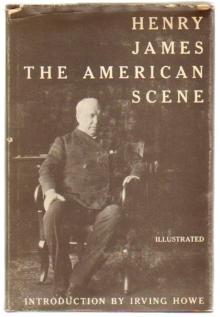 The American
The American The Wings of the Dove, Volume 1 of 2
The Wings of the Dove, Volume 1 of 2 Frost at Midnight
Frost at Midnight Morning Frost
Morning Frost The Portrait of a Lady — Volume 1
The Portrait of a Lady — Volume 1 Fatal Frost
Fatal Frost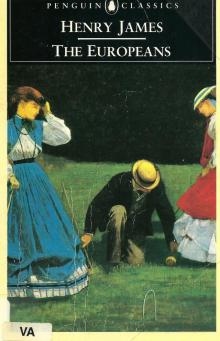 The Europeans
The Europeans The New York Stories of Henry James
The New York Stories of Henry James Great Short Novels of Henry James
Great Short Novels of Henry James Washington Square
Washington Square The Portrait of a Lady — Volume 2
The Portrait of a Lady — Volume 2 The Ambassadors
The Ambassadors The Wings of the Dove
The Wings of the Dove The Princess Casamassima (Classics)
The Princess Casamassima (Classics) The Coxon Fund
The Coxon Fund First Frost
First Frost Henry James
Henry James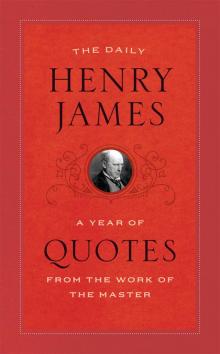 The Daily Henry James
The Daily Henry James Travels With Henry James
Travels With Henry James The Reverberator: A Novel
The Reverberator: A Novel What Maisie Knew (Henry James Collection)
What Maisie Knew (Henry James Collection)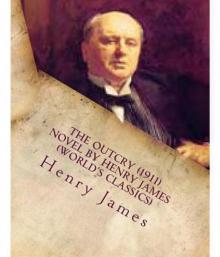 The Outcry
The Outcry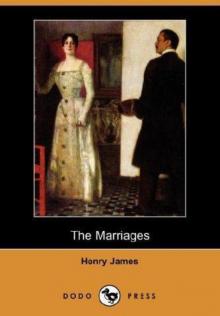 The Marriages
The Marriages The Wings of the Dove, Volume 2
The Wings of the Dove, Volume 2 The Bostonians, Vol. I
The Bostonians, Vol. I The Outcry: -1911
The Outcry: -1911 The Complete Works of Henry James
The Complete Works of Henry James Letters from the Palazzo Barbaro
Letters from the Palazzo Barbaro The Pupil
The Pupil The Bostonians, Vol. II
The Bostonians, Vol. II Pandora
Pandora Glasses
Glasses The Princess Casamassima
The Princess Casamassima What Maisie Knew
What Maisie Knew The Reverberator
The Reverberator The Golden Bowl - Complete
The Golden Bowl - Complete Confidence
Confidence Wings of the Dove (Barnes & Noble Classics Series)
Wings of the Dove (Barnes & Noble Classics Series) The Spoils of Poynton
The Spoils of Poynton